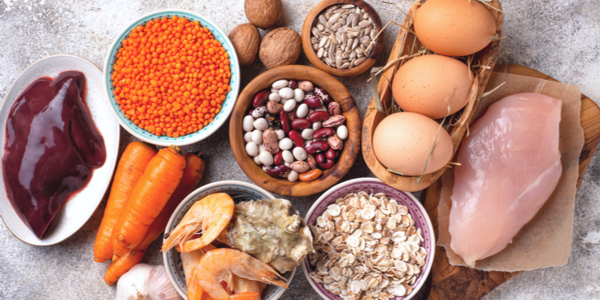
Popular minerals like sodium, potassium, and chloride receive a lot of attention for their electric functions. However, zinc is another important essential mineral that warrants acknowledgment.
Because it is an essential mineral, meaning the body cannot make it on its own, it is vital to consume enough zinc from the diet. But what’s the right amount of zinc to consume?
In this article, learn everything you need to know about zinc, including what is zinc good for, intake recommendations, and what foods have zinc.
What Is Zinc?
Zinc is an essential nutrient required for numerous processes in the body. It is naturally present in some foods, added to others via fortification, and available as a supplement. In addition, many cold lozenges and various cold medications contain this immune-boosting mineral.
So, what does zinc do?
This mineral is involved in various aspects of cellular metabolism and serves as a catalyst for more than 100 enzymes. Furthermore, it plays roles in:
1. Gene expression
2. Protein synthesis
3. DNA synthesis
4. Wound healing
5. Growth and development
6. Cell division
7. Sense of taste and smell
Recommended Intake
Intake recommendations for zinc are expressed by Adequate Intake (AI), which is a level assumed to ensure nutritional adequacy for most of the population. The AI recommendations below are denoted in milligrams (mg) of zinc throughout the lifespan.
Age
Male
Female
Pregnancy
Lactation
0-6 months
2 mg
2 mg
7-12 months
3 mg
3 mg
1-3 years
3 mg
3 mg
4-8 years
5 mg
5 mg
9-13 years
8 mg
8 mg
14-18 years
11 mg
9 mg
12 mg
13 mg
19+ years
11 mg
8 mg
11 mg
12 mg
Interestingly, recommended intakes may be higher for vegans, vegetarians, and those who eat very plant-based in general. This is because some plant foods like whole grains, cereals, legumes, and others contain phytates, which can bind zinc and inhibit its absorption.
Although numerous plant foods are high in zinc, it is less bioavailable than the zinc present in animal foods.
Zinc-Rich Foods
A wide array of foods are high in zinc and while oysters take the cake for the highest amounts, red meat and poultry supply the majority of zinc in the American diet. Other foods with zinc include:
• Oysters
• Beef
• Crab
• Lobster
• Pork
• Beans
• Breakfast Cereals
• Chicken
• Pumpkin seeds
• Yogurt
• Cashews
• Cheese
• Oatmeal
• Milk
• Almonds
• Peas
Zinc Deficiency and Toxicity
Like other vitamins and minerals, too much or too little zinc poses its set of health problems. Below details the risks of zinc deficiency and toxicity,
Deficiency
Most people in the United States consume enough zinc, however, some evidence suggests that older adults tend to have less intake. While overt deficiency is rare, it can occur in those with genetic mutations, alcohol addiction, and anyone taking immune-suppressing medications.
Others at highest risk are those with GI diseases like Crohn's disease, bulimia and anorexia, malnutrition, chronic kidney disease, people with sickle cell anemia, and pregnant and breastfeeding women.
Symptoms of mild zinc deficiency are:
• Diarrhea
• Decreased immunity
• Thinning hair
• Decreased appetite, often due to loss of sense of smell and taste
• Mood disturbances
• Dry skin
• Fertility issues
• Impaired wound healing
Symptoms of severe deficiency include:
• Impaired growth and development
• Delayed sexual maturity
• Skin rashes
• Chronic diarrhea
• Behavior issues
Toxicity
While zinc deficiency can cause negative side effects, zinc toxicity can also lead to health complications, with the most common cause being over-supplementation.
Most pressing, excessive zinc intake can cause deficiencies of other nutrients– namely, copper and iron. Copper and iron balance each other out, so because zinc can reduce the absorption of copper, over-consuming zinc can ultimately lead to iron deficiency anemia.
Signs of toxicity:
• Loss of appetite
• Nausea and vomiting
• Diarrhea
• Abdominal cramps
• Headaches
• Reduced immune function
• Decreased HDL cholesterol levels
Zinc Supplementation
As mentioned, zinc supplementation is quite common because of its association with immune function and reducing symptoms of the common cold. However, it is important to note that most people can obtain more than enough zinc from whole foods.
Nonetheless, different forms of zinc supplementation exist and include zinc acetate, zinc gluconate, and zinc sulfate. The percentage of elemental zinc differs amongst these different forms, but research has not yet determined whether there are differences in absorption, bioavailability, or tolerability of the different forms. However, it is known that zinc oxide is poorly absorbed and should therefore be avoided.
Moreover, because excessive supplementation is associated with fairly common toxicity risks, it is advised to only take supplementation under the care of a professional who can dose properly.
Health Benefits of Zinc
An adequate intake and balance of zinc benefit the body greatly. The mineral plays a vital role in immune function, wound healing, and so much more.
Immune Function & The Common Cold
Zinc helps develop and activate T-lymphocytes, which help protect the body from infection and fight cancer proliferation. Even mild zinc deficiency can impair immune cell (macrophage, neutrophil, and killer cell) function and reduce lymphocyte activity necessary to mitigate toxins. This is likely why low zinc status is associated with increased susceptibility to pneumonia and other infections.
Furthermore, sufficient zinc status may reduce the severity and duration of common cold symptoms by directly inhibiting rhinovirus binding and replication and suppressing inflammation. However, researchers indicate more research is needed to determine optimal dosage, formulation, and administration before making a general recommendation.
Still, many people do find some success by taking extra zinc during a cold.
Wound Healing
This mineral helps with wound healing by helping to maintain the integrity of skin and mucosal membranes and plays a role in collagen synthesis. In fact, zinc is frequently used in medical settings to treat burns, ulcers, and other skin injuries.
Diarrhea
Preventing diarrhea through adequate zinc intake is a delicate balance because deficiency and toxicity can both cause this unpleasant symptom. However, it is undeniable that zinc deficiency causes changes in the immune response that make people more susceptible to infections that cause diarrhea.
Research shows that poor and malnourished children in India, Africa, South America, and South Asia experience less severe and shorter duration of diarrhea when treated with zinc supplements. However, treating children who have adequate zinc status does not produce the same result.
Reduce Risk of Age-Related Diseases
Zinc can relieve some oxidative stress and bolsters the immune system by boosting T-cell and natural killer cell activity, which may prevent the body from infections. And because the elderly tend to be more zinc-deficient than other age groups, it may specifically impact age-related diseases like pneumonia, age-related macular degeneration, and others more.
Indeed, older adults who supplement with zinc experience improved influenza vaccination responses, reduced pneumonia risk and boosted mental performance.
The Takeaways
Zinc is an essential mineral that must be consumed in the diet. It is present in animal and plant foods, but bioavailability is greater in animal foods because they do not contain phytates. Nonetheless, some of the best sources include oysters, red meat, poultry, beans, pumpkin seeds, and cashews.
Zinc is involved in numerous physiological processes such as gene expression and wound healing and of course, boosts the immune system. While supplementation is popular because of its association with improving the common cold, excessive intake is associated with iron deficiency and should be avoided.
Still, those who eat a high amount of plants and those with conditions that inhibit zinc absorption may need higher requirements.
References:
Kubala J. Zinc: Benefits, Deficiency, Food Sources and Side Effects. Healthline. Written November 14, 2018. https://www.healthline.com/nutrition/zinc#benefits.
Zinc. NIH Office of Dietary Supplements. U.S. Department of Health and Human Services. Updated December 7, 2021. https://ods.od.nih.gov/factsheets/Zinc-HealthProfessional/.







